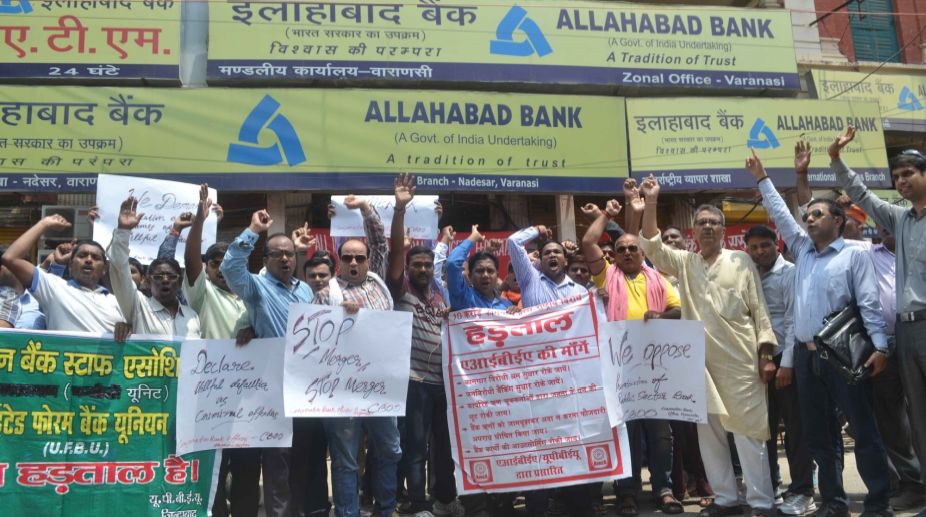Banking services were partially affected due to nationwide strike
Banking services were partially affected in the country in response to a nationwide strike called for today and tomorrow by…

(Photo: IANS)
Banking operations across the country were hit on Tuesday as over 10 lakh bank employees in more than 1,30,000 branches pan-India struck work — protesting against reforms in the banking sector among other issues — thereby affecting cheque-clearing activity. However, private lenders like ICICI Bank, HDFC Bank, Axis Bank and Kotak Mahindra Bank functioned normally.
An official of the United Forum of Bank Unions (UFBU) — the umbrella body of nine unions which has given the strike call — said “over 10 lakh bank employees spread in more than 1,30,000 branches across the country struck work hitting cheque-clearing activity”.
Advertisement
Most public sector bank branches had their shutters down.
Advertisement
Banking operations in Tamil Nadu were affected with around 55,000 bankers striking work pressing for their demands, said a report from Chennai citing a top All India Bank Employees’ Association (AIBEA) leader.
“The strike is a huge success. It is a dawn-to-dusk strike as cheque clearing operations start at 6 a.m. Bankers working in around 10,300 branches struck work protesting the policies towards the sector,” AIBEA General Secretary C.H. Venkatachalam said.
Venkatachalam said around 12 lakh financial instruments valued at around Rs 7,300 crore could not be cleared.
Government treasury transactions were impacted. Foreign exchange transactions, import and export bill transactions and sanction of loans, among others, were also affected.
In most of the places, clearing operations, particularly outward clearing, was seriously affected.
Around 42,000 bank employees and officers from Maharashtra joined their colleagues in the daylong nationwide strike, with plans to intensify the agitation, a top official said.
“The strike was a total success in Maharashtra. No banking transactions could be carried out in any bank branches, cheques clearing operations were completely paralysed. Bank ATMs which worked for a couple of hours initially also could not dispense cash later,” said UFBU Convenor Devidas Tuljapurkar.
The strike hit around 42,000 branches of 22 public sector banks including the monolithic State Bank Of India and IDBI, 18 old generation banks, eight foreign banks and 56 Regional Rural Banks in Mumbai and Maharashtra, said AIBEA leader Vishwas Utagi.
Tuljapurkar said the strike was to oppose banks privatisation, banks consolidation and for initiating tough measures against big corporate loan defaulters, besides opposing the increase in service charges and reduction in interest rates on saving accounts by banks, which is an attempt to shift the burden of big loan defaulters onto the common masses.
Several thousand bank employees staged a rally at Azad Maidan in Mumbai which was addressed by leaders of UFBU and its nine affiliated unions.
Discussing plans to intensify the agitation, Tuljapurkar said the bank staffers will now join a march to Parliament on September 15, followed by another two days’ strike in late October-early November.
The strike comes after the talks between UFBU on one side and Indian Banks’ Association, Chief Labour Commissioner and Department of Financial Services (DFS) failed on Friday.
“All India State Bank Officers’ Federation and All India State Bank of India Staff Federation, being part of the UFBU, will participate in the strike. It is likely that our bank will also be impacted by the strike,” State Bank of India (SBI) earlier said in a regulatory filing in the BSE.
Among the 17-point charter of union demands, the main relates to the government’s denial of adequate capital to public sector banks, thus creating conditions for privatisation, an AIBEA statement said on Tuesday.
“The one-day banking strike has been successful as close to 9,500 ATMs and around 3,000 branches are closed with 70,000-100,000 bank employees participating in the protest in West Bengal,” AIBEA’s (West Bengal) General Secretary Rajen Nagar said in Kolkata.
All India Bank Officers’ Association’s (West Bengal) General Secretary Sanjay Das said employees and officers from cooperative and grameen banks including regional rural banks also participated in the strike and private banks’ branches were mostly closed as their employees supported unions’ demand.
“The strike is 100 per cent successful. Bank employees and officers are conducting demonstration in front of banks’ branches and ATMs,” Das said.
Thousands of employees of state-run banks began day-long strike in cities and towns across Karnataka, affecting cash and other transactions for the day, said a report from Bengaluru.
“We have received an overwhelming response from all our members for the strike call in support of our demands, including our opposition to the merger of state-run banks,” state AIBOC General Secretary A.N.K. Murthy told IANS.
In Bengaluru, hundreds of employees of various banks took out a rally and staged demonstrations protesting against the government’s proposal to merge their banks.
Private banks, including ICICI Bank, HDFC Bank, Axis Bank and Kotak Mahindra, however, opened for business as usual
Banking services were badly affected in the Left-ruled Tripura on Tuesday as most of the major banks remained closed due to the nation-wide employees’ strike.
The striking employees were also demanding compensation to employees for extra work done on account of demonetisation of high value currencies, and booking loan defaulters.
According to Nikhil Das, a leader of the striking employees, around 3,000 bank employees belonging to about 414 branches of 15 nationalised, regional, rural and cooperative banks in the northeastern state took part in the strike in Tripura.
While banking operations across Kerala were hit by Tuesday’s strike, new generation banks were reported to be functioning normally. There were sizeable crowds in front of many ATMs and at some of these, the cash finished by noon. The worst affected were cheque clearing operations.
Advertisement